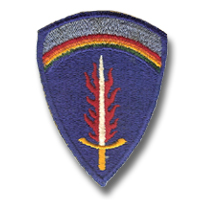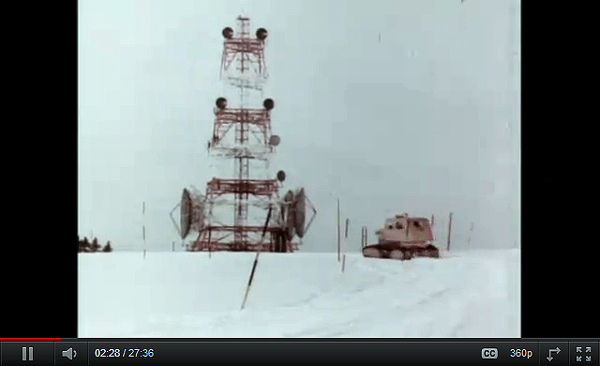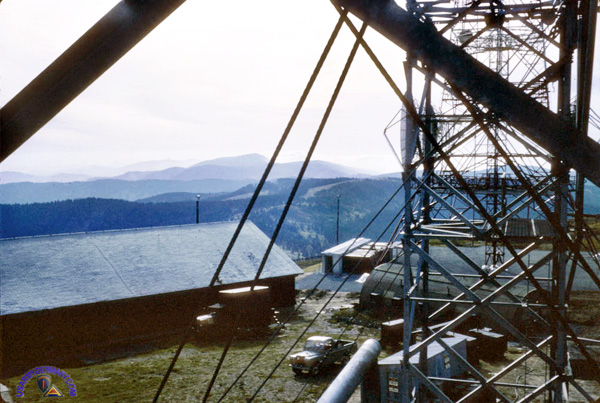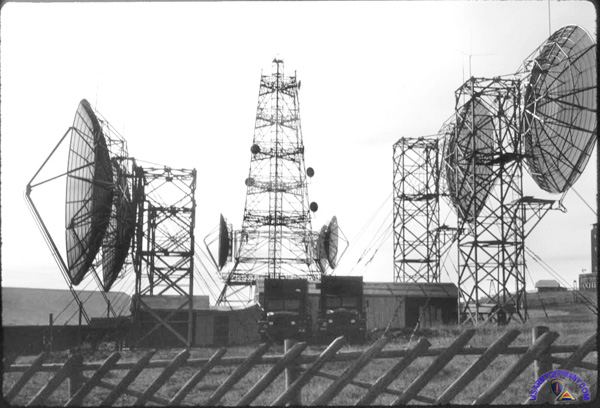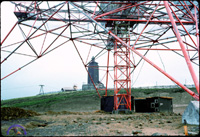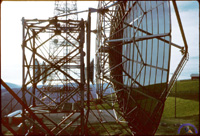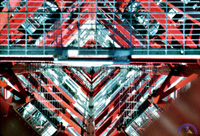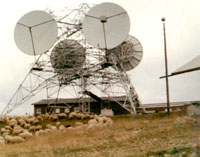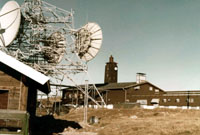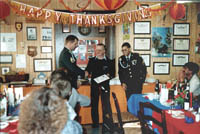| If you do
NOT see the Table of Contents frame to the left of this page, then
Click here to open 'USArmyGermany' frameset |
|||||||||
|
Feldberg-Schwarzwald Radio Station |
|||||||||
|
|
|||||||||
|
|||||||||
|
|
|||||||||
| Feldberg-Schwarzwald Radio Station | |||||||||
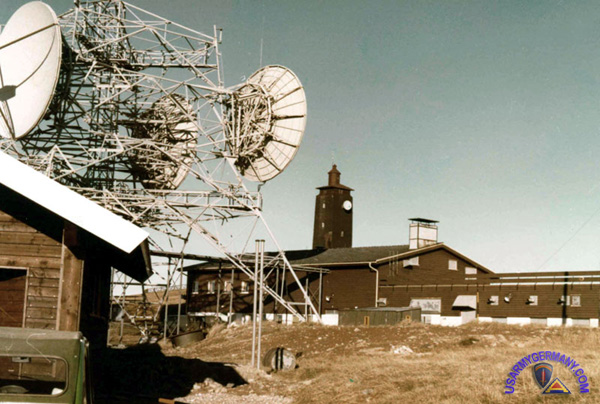 Feldberg-Schwarzwald Radio Station, 1980s |
|||||||||
| 68th Signal Battalion | |||||||||
| (Source: Email from Larry Williard, B Co, 68th Sig Bn, 1963-66) | |||||||||
| I was stationed there when they built the tower in 1965 and 1966. We lived at the bottom of the mountain in the Wald Hotel Andress. I remember some of the troops names there was only about 8 of us. That movie (see above "You Army Reports") was made much later than 1966 - I believe in the early 70s. I left Feldberg in late 1966. We never had to pick up mail at the post office since we lived in the Hotel we got mail there. Also we only had one Helicopter land on the Mt. and that was after we had more than a 1 hour outage on my watch and they send the brass down to find out why. It was the longest outage to date. I solved the reason. About 3 years after I left they moved the guys out of the Hotel and built the extra buildings on the Mt for barracks. When I was there there was only one Chalet, the one on the far left and the tall building in the distance on the right was the French weather station. The bigger buildings were not there. We did originate the snow cat, though. We burried lines in the ground all the way up the Mt. so we could drive in a blizzard which we had a lot of. As long as we stayed between the lines we got a steady tone, drift to either side and we got a different tone. More than once we almost drove off the Mt. even with the tones. The first of my pictures (above) shows the Chalet on the left; the quonset hut was the generator shack and the equipment boxes in between. All the other buildings in all pictures except the French Weather station were temporary. Its strange but I don't have any pictures after the temporary towers were removed and everything was finished. I might have some in prints. These were slides. I have a lot of pictures of the mountains and sky slope and the German TV tower, the hotel, etc. |
|||||||||
|
|||||||||
| (Source: STARS & STRIPES, Feb 28, 1967) | |||||||||
| The Feldberg-Schwarzwald ET-A Site is located on top of the highest mountain in the Schwarzwald (Black Forest). This is the northern station of a 60-voice channel 246-mile troposcatter system link between southern Germany and northern Italy (Feldberg - Savona). 16 enlisted men of Company A, 68th Sig Bn man the site. (The site is authorized 25 EM and one officer.) Four 30-foot parabolic antennas are mounted on a 160-foot tower. |
|||||||||
| 52nd Signal Battalion | |||||||||
| 1977 | |||||||||
| (Source: EurArmy Magazine, Sept 1977) | |||||||||
| ISOLATED SITE by CPT Lynn Havach One guy calls it the "land of the horizontal icicles." Another says it's the best location in the Army. A third says, "The whole place is gray. It's like living in a bottle of fog." Still another says it's a "bump-into-your-buddy-everywhere" site. The site these soldiers are referring to is a 5th Signal Command microwave relay station on top of the Feldberg, the highest mountain in the Black Forest. The station is in Germany's southwest corner, 36 kilometers north of Switzerland and 30 kilometers east of France. The unit designation reads like this: Feldberg/Schwarzwald Microwave Relay, 589th Signal Co, 52nd Signal Bn, 160th Signal Gp, 5th Signal Command. That designation is almost bigger than the unit itself. This Army study in isolation perches 4,758 feet above sea level and is home and office for two E-7s, one E-6, one E-5, six E-4s, one PFC and a pregnant cat who by now may have given birth and boosted the Feldberg population by 40 percent. Ferguson the cat, however, is the only full-time Feldberg female. Her male soldier friends live and work in a small, paint-peeled building and share the mountain's summit with a German weather station and television tower, a French Army microwave station and a Bundeswehr-operated NATO troposphere scanner site. Their two-floor home and office sits smack against a gray antenna with two large white dishes facing south and two facing north. The place isn't plush, but it has its good points: But the place has its bad points, too. Karlsruhe, 125 miles away, is the nearest American military facility. It's here that the unit purchases its $1,100 worth of food each month. Stuttgart, home of its headquarters, is even farther away. The unit goes through a 1,000 liters of gasoline a month and 200 to 300 gallons of official fuel. The nearest doctor is a German civilian at the bottom of the hill and dental work has to be done at the Canadian Air Force Base in Lahr, 50 kilometers away. It snows on die Feldberg from September to April most years and high winds create 15-foot drifts and those "horizontal icicles." Sergeant First Class Samuel Glory says, "The weather's pretty good here -- seven months of snow and five months of late fall." Specialist 4 Thomas F. Pottorff, who arrived at Feldberg four days before Christmas two years ago, says last year they had snow on July 3rd, only 60 days of sunshine and one night when the weather station recorded 200-kilometer per hour winds. "It was clear the night I arrived here," Poltorff says, "stars and everything, then for two weeks I couldn't see anything." The "resident mountain man," Specialist 5 William A. Babst, knows about the Feldberg weather too. Billy, as he's called, has been there since November 1975, listening to "that wind whistle under my door," and seeing snow so deep the only way off the mountain was with one of the six treaded snowcats the guys got to by walking out the second-floor fire escape over crusted snow and ice. Mail comes twice a week, the chaplain once a month. Baked goods often flop before cooks discover correct stove adjustments to compensate for the altitude. And there're two kinds of female companionship -- not much and none. Glory and Staff Sergeant Leslie Barger, Jr., die mess sergeant, have wives in the States. But things are just about as hard for the bachelors. Specialist 4 Richard H. Stoll has to go all the way to Karlsruhe to visit his Gernan kindergarten teacher girlfriend. He thinks Feldberg is a nice place but says, "I miss my girlfriend." Experienced signal soldiers say the sameness of isolated communications sites is the worst part and Feldberg is no exception. If there's no rain, snow or fog to keep the site gray, there're always low-flying clouds. And the loneliness. Glory's 12 years at isolated sites lead him to say, "I've had a lot of exposure to isolation. It doesn't make it any easier but it helps when you know what to expect." Living with hardships other units rarely face is a day-in, day-out job at the Feldberg site. AFN-Stuttgart-FM comes in clear, but AM fades. The club room television receives German, French, Swiss and Italian shows, but no American ones. The site has one telephone, but it's German, not American military. The site's mission is communications, but the people there can't use the radios for ordinary traffic, only in emergencies. Shifts are long -- 12 hours. There really isn't much to do except listen to the droning equipment, the compressor sucking moisture from the lines, and wait for something to go wrong. Sergeant First Class Ciampa says, "We occasionally have a power failure in a storm, but nothing's happened in the last two months." The site maintains a stock of repair parts. There's also a complete backup system for each receiver and transmitter and a generator that restores power automatically and immediately when a failure occurs. The shift workers, all 26V MOSs (Strategic Microwave Systems Equipment Repairmen), perform routine maintenance and check dial readings. But basically, the site's equipment automatically relays USAREUR communications between Germany and Italy. Feldberg is the"pickle-in-the-middle" between Donnersberg, 120 miles to the north, and Savona, Italy 243 miles over the Alps to the south. So in their spare time, the guys find other things to do. One erected a huge wall mural of the Neuschwanstein castle then pasted eight Playboy bunny symbols about the size of pin heads on it. New assignees often spend days looking for the rabbits. Some guys hike, volksmarch, jog and explore. A few even ski on their mountain, but they use their own equipment. The Army tried to help by sending the Feldberg unit ten sets of skis and poles, but unfortunately only included three pairs of boots (sizes 12½ and 13) and no bindings. The 5th Signal Command has the reputation as a stronghold of NCO professionalism, and the Feldberg site is a good example of what that fine-sounding phrase means. "You can call it NCO professionalism if you want," says SSG Barger. "But what it also means is putting the man with the knowhow in the job he's qualified for. "Let's face it. The job of site chief doesn't need someone we have to train. The logical choice from the officer ranks would probably be a lieutenant but he couldn't touch the experience of these sergeants who've been in the game 10, 12, maybe 14 years." NCO professionalism works so well at Feldberg, as a matter of fact, that it sounds easy, to hear SFC Glory tell it. "These guys are mature. We don't tell them to keep their rooms straight, or pull maintenance, or mop the floors. They do it because they want to. They take PT on their own, too." Glory thinks maybe the smallness of the site has something to do with how well things work. He enjoys the person-to-person atmosphere at Feldberg as opposed to the ". . . sergeant-to-specialist tone I've seen elsewhere." This means it's not so difficult to get people to work. "When the truck pulls up, people come crawling out of their holes to get the job done." There are also few disciplinary problems at the site. The bulletin board's Article 15 slot is bare and has been for as long as people can remember. There are no problems with drugs and no one drinks excessively. Each soldier assigned to Feldberg has to serve six months there. They're forced to stay no longer, but most do because they like it. SP4 Mace calls Feldberg "about the best job in the Army. I'm staying two years. I love the contact with our NATO allies I couldn't get on a big base." SP4 Pottorff has his stereo, ". .. and that's my hobby," so he's staying. Specialist 4 Michael A. Robenson, the driver, says the place "... reminds me a little of Colorado where I come from." SP4 Stoll says, "It's a good place to save money." It can be a quiet place, too. There's no loud music playing constantly. The guys respect their buddies sleeping off a shift. The guys keep pretty much to themselves and get along well. "I don't have to play referee up here," says SFC Glory. "The only bad thing here," says SFC Ciampa, "is that one day is the same as any other. Frankly, I hate it here because I don't like snow and there're other places I'd rather be than Germany -- but I'm doing what has to he done." |
|||||||||
| 1984 | |||||||||
| (Source: ECHO, May 1984) | |||||||||
| Snow-bound but satisfied Winter is a way of life at the Schwarzwald-Feldberg site by Lee Royal Like storybook waifs who leave a trail of bread crumbs to find their way home, a handful of soldiers from the 589th Sig. Co. must mark their way to work. In their case, they follow specially marked poles stuck in the snow every few feet -- guides that lead them to their signal site nestled in the Black Forest above the town of Feldberg. Like many mountain towns, Feldberg is in a recreation area visited for winter sports like skiing, sledding and hiking. But, for a few soldiers, it's home. The residents, workers and visitors begin the ride to the site from a Feldberg hotel. The 20-minute drive up the hill to the site can be rather tedious; the trip is made in a Snow Cat that reaches a top speed of six miles-per-hour. During the winter, the weather at the site can get pretty rough; the winds can reach 100 miles per hour. It's also quite a trick finding one's way up and down the hill in a snow storm. SSgt. Joseph Viveiros, site chef, says, "When you can't see very far ahead, you follow the poles, and when you can't see the poles you rely on instincts. We also have walkie-talkies so if someone gets lost we can find them." They aren't the only ones who follow the poles nearly two miles up the hill. The detachment shares the hill with French and NATO signal soldiers, Germans who run a weather station and TV tower, and German ski patrollers. Four civilians work at the 589th site as well. 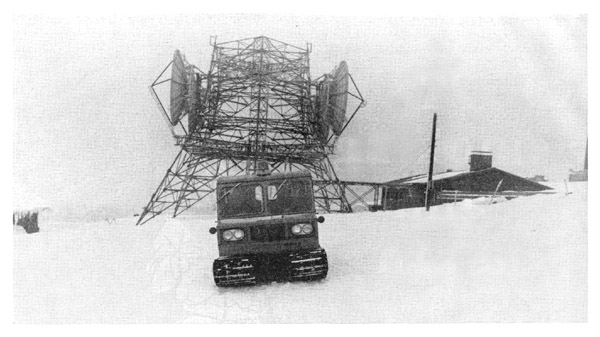 If the other sites need supplies brought up the hill, the 589th soldiers make "runs" to help them out and the French and NATO sites once held an exercise on the hill and the 589th detachment helped transport a platoon of soldiers up the mountain, Viveiros says. Although the detachment's soldiers seem secluded in their mountain home, they do manage to socialize with the local residents. The French and German soldiers occasionally stop by for an evening, especially when the weather hampers a trip down the hill to town. The detachment also invites the local Burgermeister, the police chief, the German hotel employees and other soldiers from the 589th up to the site for get-togethers. "The Germans who work at the hotel are really nice and we've gotten to know them pretty well since we wait in their lobby for the Snow Cat. Sometimes they come by with coffee while we wait," says Sp4 James Mize, microwave repairman. Sometimes the site gets surprise visitors from the hotel. Most of the time they are lost or just looking for freshly snow-covered hills to traverse. Even though they enjoy occasional get-togethers with the locals, it can get pretty isolated during the long winters, but the soldiers do say there's never been a case of cabin fever. They credit that to the married soldiers because they occasionally bring their families up to the site for a change of pace. The soldiers who live at the site also think up projects to keep them busy. "We have films and mini-TV provided by AFN," Viveiros says. "We also have our own photo lab and weight room. Depending on the weather conditions, we go skiing a lot in our spare time. We try to think of things to occupy ourselves. We do all the small repairs here and even painted the training room in camouflage." When it comes to "getting out," however, things aren't so easy. "It looks like you've been through ten miles of bad weather by the time you get to a disco;" Viveiros says. "It takes about an hour to get there because you have to drive down the hill, hop in your car, and then drive another 40 to 45 minutes to the nearest town with a disco. "By the time you arrive you're sort of raggedy looking. But we try to get out to the disco once or twice a week to stay in form," he says with a laugh. Going out for a "night on the nearest town" isn't the only diffculty cause by their remoteness; the closest military community is three hours away. "It takes three hours to drive to the company headquarters and another couple of hours to take care of your business, and then three more hours driving back. That takes up the whole day," Viveiros says. "When we need to take care of our personal stuff, like going to finance or the dispensary, we have to wait until the next run. But we make runs twice a week - once to Stuttgart and once to Karlsruhe." It can be frustrating for the soldiers living outside a large military community. When they have problems, they can't be as readily resolved, but problems get taken care of with a little help from their friends at the site. Mize says they really care about each other. Since the isolation makes it different from most assignments, they pull closer together. "I've been here for three years and it's nice to go home to my wife after work," says Spy Gary Colley, maintenance chief. "It's nice to get away, but I start to think about the site when I'm off duty. "What did I do -- what didn't I do?' Many times I've gone back up when I was off duty." The soldiers who live at the site often feel like they're never off duty. Since they work and live at the same place they are often called upon to do a little extra, like shovel snow, just to get in and out of the building. Even the solders who live off-site pitch in and shovel snow however, and they also double as drivers for the Snow Cats and mechanics when they need repairs. "People have the wrong image of isolated sites," says Spy Anthony Tarquinio. "When most people think of a remote site they imagine a guy with long hair wearing civilian clothes. "When someone shows up at the bottom of the hill, whoever is off duty will go down and pick the visitor up," he explains. "Since the driver is off-duty, he will also be in civilian clothes." Tarquinio stresses that haircuts are gotten when needed, and that uniforms are worn for duty. He also says the detachment must be self-sufficient. "We do everything on our own. We have to be able to survive up here." When the signs of summer finally appear at the end of June, the detachment looks forward to barbeques and a little summer fun. For a while, they can even drive to the site in their cars. They know, however, that it's only a short respite from the cold, as the winter returns each year by mid-September. The Feldberg site soldiers spend so much time in winter conditions they often overlook some of the weather's more obvious effects. "The French needed some help bringing up some supplies one time, and I forgot to take my hat with me," Colley recalls. "On the way back the French soldiers kept looking at me and I couldn't figure out what they were staring at. I finally felt my face to see what was so fascinating. I had icicles hanging off my ear." |
|||||||||
|
|||||||||
|
|
|||||||||
|
